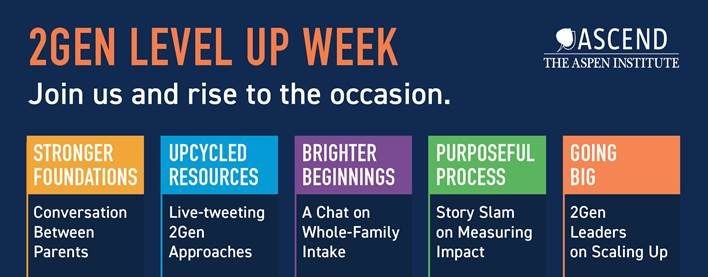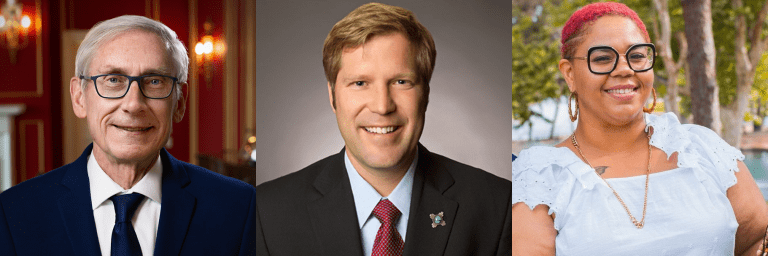Co-Creating the Future: How States are Scaling What Works for Families
When funding becomes scarce and politics impact programs, how can government leaders stay true to the families they serve?
In short, by putting community voice at the center of everything they do.
To support the leaders grappling with these complex questions, Ascend at the Aspen Institute hosted Dr. Nathan Chomilo, Minnesota’s Medicaid medical director, Dr. Teresa Ramos, inaugural secretary of the Illinois Department of Early Childhood (IDEC) for the conversation Big Moves, Bold Partnerships: A Public Sector Conversation on Scaling for Family Success.
These groundbreaking state leaders are forging innovative partnerships and shaping policies that uplift families by co-creating with communities. Their conversation featured powerful reflections and four takeaways for other state leaders across the country who are committed to building and scaling systems that meet families where they live, work, play, and imagine.
- Meet People Where They Are and Imagine
For systems to work, families must be able to access them easily and on their own terms. Dr. Chomilo emphasized the importance of using communication tools that people use regularly to connect in their daily lives. During Medicaid re-enrollment, his team reached families through WhatsApp, local radio, and faith-based organizations, meeting people where they already were. Investing in organizations that help families navigate public programs and listen when they share their barriers is essential to this work. Even the best-designed systems are underutilized when people don’t know how to access them.
Dr. Ramos echoed this, noting that her agency often receives Facebook messages at 2AM from families looking for support – and that these messages do get answered. The dedication and innovation from these states teams is an inspiring reminder that families are seeking systems that are human, timely, and responsive – and that leaders can deliver them.
- Pair Evidence with Experience
Data helps reveal where services are falling short, but it doesn’t always reflect the voices and experiences of families themselves. Dr. Ramos pointed to a broader challenge in many systems: policy infrastructure often centers experts while leaving limited room for families to shape decisions. To move away from one-size-fits-all approaches, she called for deeper, more intentional relationships with communities, ensuring that family voice is not just heard, but embedded at every level of policymaking.
Dr. Chomilo reinforced the importance of co-creating with families, especially those who have historically faced the most inequality and gaps. Dr. Chomilo explains that expanding opportunity for all children and families is a commitment in scarcity and abundance: “Equity work doesn’t stop when there’s plenty, it matters even more when there are cuts, so we can bear witness to and track what is impactful.” By embedding equity and co-creation throughout policymaking, leaders can build more responsive systems and advance meaningful change rooted in the lived experiences of communities that have experienced the most inequality.
- Share What You Know – and What You Don’t
Knowledge is power, but sharing knowledge increases that power. Dr. Ramos shared an example of a cross-sector partnership between Chicago and the McCormick Foundation. The Foundation invested in data collection to better understand who was using public services and which programs were most effective. Instead of holding onto that data, the Foundation collaborated with the city in order to better use this data to drive systems change for families. The Foundation shared their insights with the city, allowing public-sector leaders to design more responsive and targeted supports.
The Foundation invested in Chicago’s Department of Education and Support Services to better understand the children and families served by public programs and to identify service gaps. Dr. Ramos reminded us that co-creating successful initiatives for families is about more than just responding to the numbers: “Data helps us find gaps in service, but we cannot stop at filling the gaps, we also have to continually ask what the community wants to see in the solution.” Insights from this data and the families served empowered public-sector leaders to design more responsive and targeted supports. Building on the success of the Chicago model, Illinois scaled the data infrastructure statewide, incorporating both lived experience and learned lessons into policymaking.
- Lead with Agility
As federal funding cutbacks squeeze family programs, state leaders have an opportunity to act with focus and flexibility to mitigate these losses. Dr. Nate Chomilo emphasized the need to stay calm and encouraged state leaders to apply the “Plan, Do, Study, Act” framework to create responsive policymaking.
The Plan-Do-Study-Act (PDSA) cycle is a framework that helps leaders test changes and improve policies in real time. The process starts with a small goal, and implements small changes to meet it – offering a bite-sized next step to analyze the results. Larger initiatives – the scaling phase – happens only after deep study of what worked (and what didn’t). Dr. Chomilo elevated this model as a way for other state leaders to iterate nimbly amid a climate of shifting challenges and needs.
To find out more about how Ascend is partnering with and empowering state-leaders to drive responsive policy for families, click here.
Related Posts















